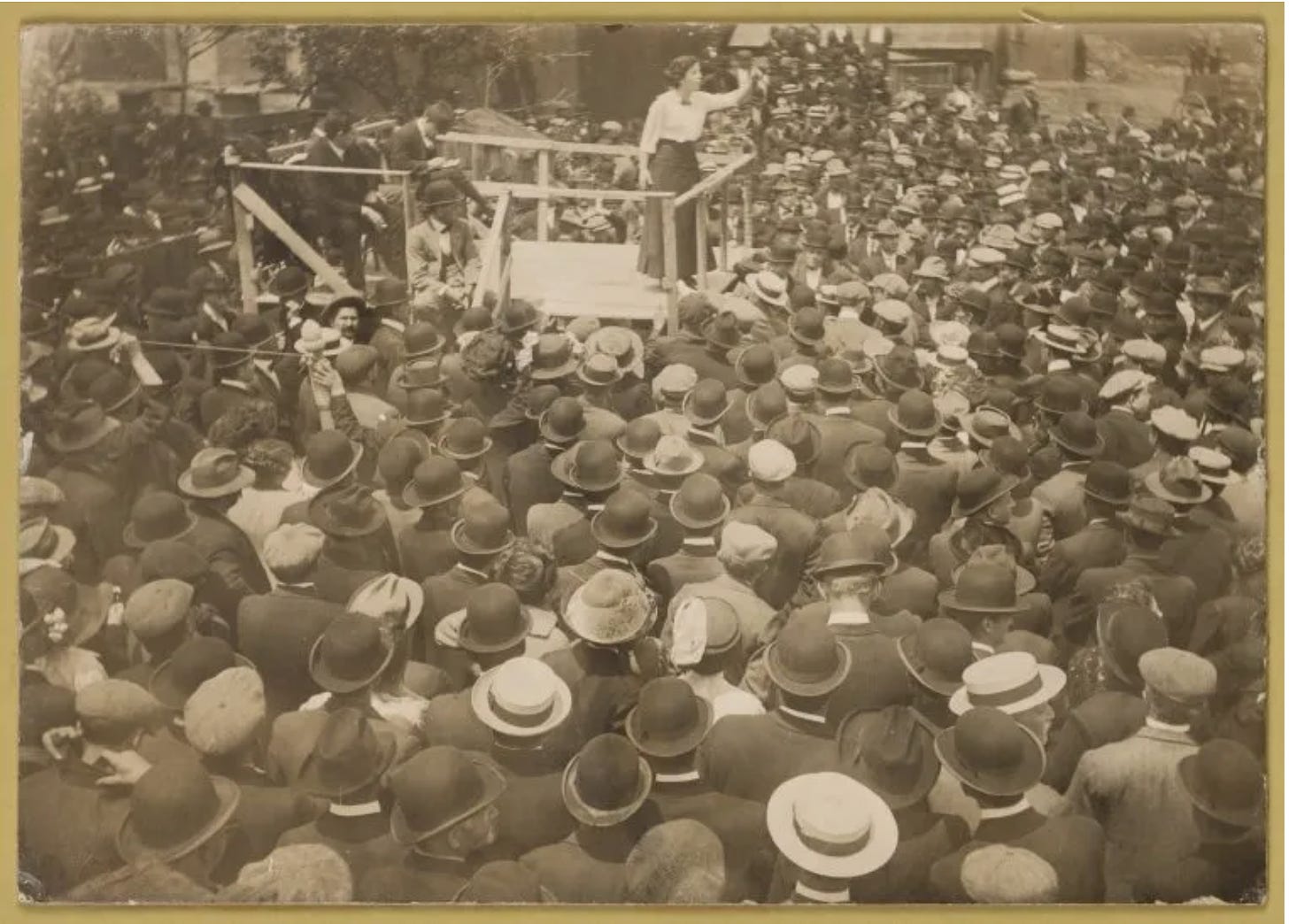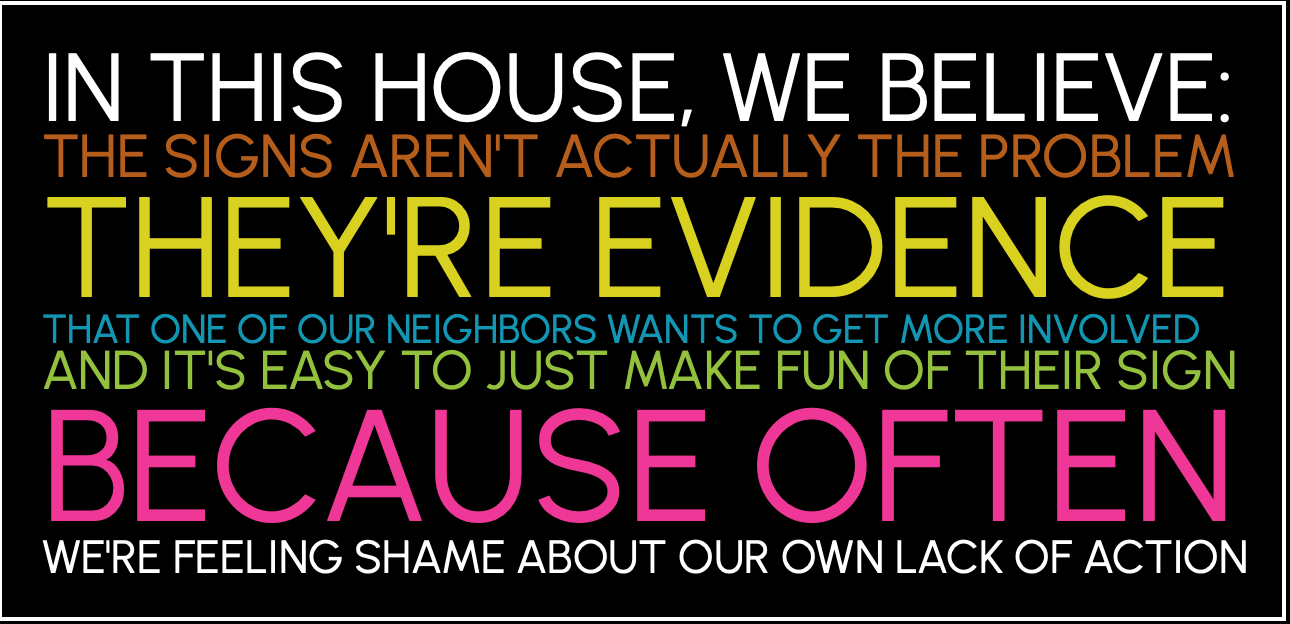Top notes: “Whoa!” you might be saying, “have I been getting a lot of White Pages lately?” And yes, I sometimes go through periods where I have both the time/ideas necessary to bank a few extra editions in preparation for expected slower times to come (like this fall, for example, when I’ll be running new Barnraisers cohorts). Also adding to a mini-pile-up, I’m publishing early because on Thursday, my kids and I are taking the train to Chicago and playing around on the cool playground near the Bean.
Speaking of the cohorts- enrollment closes one week from today. That time’ll be here sooner than you think, so if you’re interested, you can read more here and enroll here.
And, as always, if you enjoy these and have a few bucks to share so I can keep this going, oh jeez that helps a ton. That subscribe button will do the trick. If you can’t do that but you can share this with friends, that too is super helpful. And if neither is true, know that I’m still really glad to have you here and I always love to hear from you (garrett@barnraisersproject.org).
Finally, a content warning: Although it is not the sole focus of the piece, I do reference both sexual assault and intimate partner violence below.
I think that’s all. Let’s talk about liars.
Just look at my man up there! That’s Clark Stanley, but I have it on good record that you’re more likely to know him as the Rattle Snake King. I dare you to take a picture of yourself that makes you look more untrustworthy than the King. Maybe you could pull off the proto-Nudie suit. Perhaps you could prop your scarf just so. But even if I gave you a year’s planning time and a large supply of grooming products, I would bet good money that you couldn’t pull off that particular beautiful flip-phone-shaped tuft of facial hair. Oh God, I love it so much. It just whispers “I think you should have a certain level of suspicion about this dude.”
Clark Stanley is famous for being a liar. He lied about a lot of things. You knew that already, because rattlesnakes famously don’t respect monarchies, so how could he be their king? His most famous lie, though, was that he had learned (from the Hopi, of course!), how to whip up an all-purpose healing elixir made of 100% pure rattlesnake. He had a little show that he did to sell it— he’d gather up a crowd and slit a rattlesnake’s throat in front of them and then pour the fresh rattlesnake goop into a vial. Apparently, crowds would first look at the dead rattlesnake and then at Clark Stanley’s Nokia 3310 facial hair and then at the pre-prepared vials for sale and be convinced enough to buy up all his stock. Marketing!
You know where this is going. Clark Stanley was selling literal snake oil. Except he wasn’t. The stuff in his pre-prepared vials wasn't made of rattlesnake, and even if it were, rattlesnake gunk doesn’t have any medicinal properties. But he was good enough at selling snake oil, and famous enough for lying about it, that a term was coined and now Clark Stanley is immortal. The Rattle Snake King is dead. Long live the Rattle Snake King.
There are levels to this first American snake oil story, layers of race and appropriation that often show up whenever a White guy wants to lie for fun and profit. While rattlesnake oil offers no healing benefits, the oil from Chinese water snakes does. The snake oil fad caught on because folks like Stanley heard about Chinese railroad workers using medicines and tinctures from back home that were actually effective. Like the best appropriators, they weren’t curious enough about the context but loved the headline, then roped in a whole different ethnic group to lend some authentic high desert gravitas to their pitch. And before long, the lie was truth and then the lie was legend and that’s what we’re talking about when we talk about snake oil.
Last week, Karen Weise at the New York Times published an expose about Dan Price, a baffling public figure who had become famous as the One Good CEO. His deal was that he paid his employees decent money—at least $70,000— and spouted off a lot of good woke truisms. He was the techy CEO who said that corporations were greedy and that capitalism— or at least capitalism that did not include his company— was bad. He was the handsome male CEO who said that men should listen to and believe women. He was the White CEO who said, well, something slightly clunky about Black People Stuff (“I would feel proud if [my] employees take time off for Juneteenth. The time would be both paid and admired”). Um, right on, man.
The thing is, he took the time to say it, just as he took the time to increase others’ compensation and theoretically lower his own. And that time he took, to quote Price himself, “was admired.” It was admired by a lot of people, and a lot of fawning media entities in particular. Kelly Clarkson said she wanted to work for him. Many other daytime news hosts who never wrote a song half as good as “Since You’ve Been Gone” agreed. His hair (which he is clearly very proud of and which I’m sure he wishes I would refer to as lustrous) graced the cover of multiple magazines you’d find displayed at your local airport’s absolute finest Hudson News.
If you have heard of Dan Price, you have likely already heard about Wiese’s expose and, as such, you know that he isn’t actually the One Good CEO. He’s actually a horrific abuser— somebody with a consistent pattern of terrorizing women in his life. And that was true before he became known as the One Good CEO. In fact, all the woke stuff— the media appearances and the constant trumpeting of his generosity and anger at inequity and his impeccable ability to say whatever #brave progressive statement would most light up the zeitgeist— was a deliberate strategy to bury publicly available stories about how he had abused his ex-wife. It’s all really vile and awful. Wiese’s piece isn’t an easy read, but you should absolutely read it.
I’ve been around the block long enough to know that charismatic social justice-y figures— especially men— are often chonic abusers of power. That’s not a social media-specific phenomena, nor is it a recent development. Patriarchy produces charming liars. Internalized patriarchy creates a captive audience of folks of every gender who sometimes want the narcotizing shortcut of a believable lie. Truth be told, I’ve believed a fair number of charismatic liars. Truth be told, when I first noticed people’s ears perking up positively when I loudly proclaimed myself a Self Proclaimed Feminist Man or a Self Proclaimed Anti-Racist White Person, I slid pretty seamlessly into the charismatic liar role myself. Truth be told, I’ve believed my own lies, convincing myself that the mere declaration of tearfully-articulated, semi-constipated care was enough to wipe away various inter-identity crimes of omission and commission. Can I remember at least one professional conference when I was that dude who filibustered the room at length in order to inform them that White men should talk less and listen more? Oh jeez what a hacky move. Just pure Rattle Snake King-level pablum.
That’s not to say that White men are the only ones who’ve internalized the lesson that mastery of certain social justice language— especially online— can be a ticket to growing platforms and fawning attention and maybe even a fair bit of cash. From the youthful plains of TikTok to the humanity desert that is LinkedIn, you can’t throw a rock at any major website without hitting dozens of mini-online-fiefdoms in which Very Correct Influencers hold court over loyal followings of eager head nodders. I hope we all struggle with it, those of us who say we’re tending to communities of change-agents, because damn if it isn’t hard to determine where the line gets drawn between “doing it to build a better world” and “doing it for the likes.”
Something about the Dan Price story hit me harder though, and it isn’t that I was ever a true believer. The guy never really registered for me. He was just one more in an endless stream of characters who I’d occasionally see on a newsfeed or on a waiting room TV, one more character that I was supposed to know about. “Oh,” I remember saying a couple of times, as he went on about how he wasn’t like the other CEOs, about how he was a cool CEO, “good for him, I guess.”
What hit me was that this actually wasn’t just one more well-intentioned idealist who got high on a particularly potent speedball of ego, privilege and belief in their own mythology. This was a story of craven, deliberate marketing, of a man with an apparently boundless selfishness and ambition recognizing (correctly) that there was a large swath of people sad and angry enough about rigged systems to be taken as suckers. He saw that desire clearly and used it in the name of search engine optimization.
The thing is, I don’t care about Dan Price. I care about his victims. And secondarily, I care about the audience he cultivated, the audience he hoodwinked. People who cared. People who wanted a micro-dose of hope, especially from an unexpected messenger. You know, people like me. And probably people like you, whether we fell for that particular huckster or not.
Our first instinct is often to mock the earnestness and gullibility of the swindled. We know the implicit message of the Music Man— that there were plenty of towns full of dummies on the road between Gary, Indiana and River City. It’s always the earnest seekers’ fault for being swindled. It is always our earnestness that make us such eager marks. It’s always our own damn fault for hoping in the first place. I mean, Joni Mitchell tried to warn us.
“If you care, don’t let it show. Don’t give yourself away.”
Here’s the part of the snake oil story that never gets told. The reason why crowds of people in the 19th and early 20th Centuries were so desperate to place their faith in sketchy men with world-record-holding-untrustworthy facial wasn’t because they were uniquely stupid and gullible. It’s that carnival barkers like Clark Stanley were promising literal pain relief and they were literally hurting. Many of them were hurting because of substandard medicine and a non-existent Gilded Age welfare state. Many others were hurting for all those reasons and because they were employed in dangerous, high-intensity work with little or no corporate concerns for their safety. Remember where demand for some sort of magic elixir first emerged? In railroad camps, where Chinese and non-Chinese workers alike were clamoring for some sort of salve to the abuses wreaked on their body by iron and steel.
So yes, the tangible, rational desire for pain relief produced an opening for flim flam men. But the hucksters weren’t and aren’t actually the interesting story. They never are. What’s matters is the mass of people who earnestly need and desire something different, but who deserve a real solution, one founded in the tangibility of collective effort and not in the balsa-thin promises of beautiful liars.
Back in the gilded age, men like Clark Stanley couldn’t truly offer deliverance. Unions could, however. And though that era of union-drives and violent strike-breakers and robber barons protecting power at all cost didn’t offer an easy way out, it both resulted in our country’s golden age of unionization and planted the seeds that would eventually bear fruit in the New Deal.
Dan Price is a profound individual tragedy. He is a single human being who has left a tragic wake of violence and suffering in his personal life. The fact that there is a nation full of earnest seekers who are so angry and hopeless at inequity in all its forms that they'd believe a huckster like him, though, isn’t in and of itself a tragedy. There will always be hucksters. We should be honest that they have nothing to offer us. But we should look at the fact that so many wanted to believe, as an immense opportunity.
I’ve spent a fair bit of time in the past few years with smart, radical, plugged-in folks who’ve learned to be skeptical of earnest, occasionally flailing, social justice-y half steps. I have heard so many jokes about White liberals with “Immigrants Welcome Here” or “In This House We Believe…” signs. Hell, I’ve made those jokes, as if doing so offered some sort of hip, ironic hedge against the fact that I personally have an earnest sign in my own yard (mine says “Black Lives Matter,” a message that previous to a week ago would have earned a solemn, knowing nod from a certain Seattle-based CEO whose hair I won’t gratify with any glowing adjectives). We are told these signs are cringe-y, or that they are hypocritical, because we assume they were placed there by somebody who isn’t appropriately radical or who sends their kids to a private school or who didn't support the most recent affordable housing referendum.
It’s not that those critiques aren’t useful. It doesn't help anybody if your only political act in a given year is placing a sign listing every single one of your righteous political beliefs next to your flowering perennials. So too doesn't it help anybody if your only political act is giving an abusive millennial Rattle Snake King the likes and retweets he demands when he says something about how men of quality support women’s equality.
But what if we were to focus not on the assumed fatalism that all of us earnest seekers will invariably stop there, but instead live in the hope that our longing could amount to something more, something real, something collective. One of my favorite deceptively simple organizing moves is when folks who are working on a collective effort— a city or state referendum, a reparations collective, a political campaign— specifically target houses with earnest, liberal yard signs. The best of these efforts (like the best of any organizing efforts) are the most curious, where the door-knocker is legitimately interested in how the tricky interplay of hope/anger/fear/frustration is playing out for the earnest, seeking yard-sign placer. It’s in those moments when the yard-sign-placer is likely to actually take a next step, to come to a meeting, to actually become a part of something real.
Make no mistake about it. Hucksters make me really mad. Hucksters who prey on White individualism and isolation in service of reactionary conservatism make me mad because of the frightening world they create. Hucksters who prey on left-wing idealism in service of personal fame and fortune make me mad because they gum up the works for those of us trying to build something better.
In every case, though, I need to consciously remind myself that I’m not actually mad at the folks who are preyed on by hucksters, either on the left or the right. They deserve a better alternative. They are craving the chance to be a part of something bigger than themselves. That’s all I’m craving too. It isn’t their fault if the only people actually reaching out to them is the hucksters. It’s my fault for not reaching out myself, for answering my own shame about my hypocrisy with judgment for theirs. We’re all hurting. We all deserve better medicine. And if we don’t offer it to each other, we know damn well who will.
END NOTES:
This week’s song: OK, I name-checked “Both Sides Now” up above so you’d think I’d just give you the Joni Mitchell version you want, but I think you’ll enjoy what Davy Graham (another 1970s folkie who ran in the same circles) does with it here.
This week’s subscriber only discussion:
Since I’m sending this on Tuesday, you haven’t missed the party yet. I’m doing it tomorrow and it’s gonna be one of my favorite prompts (“You know how in documentaries there’s always random expert talking heads? Well, what is a topic that you know so much about that if there were a documentary on the topic, they should call you up. The one rule: it can’t be your day job. And bonus points if you give us a random fact about that topic.”).
See? Fun, right? Come join us! Either by buying a paid subscription or by sending me an email saying “Garrett, I’ve already donated to Barnraisers OR I was in one of your cohorts OR I just can’t pay, for whatever reason!”








Great article and great reflections. I listened to part of the podcast "The Rise and Fall of Mars Hill." That podcast and this article make me wonder what healthy community would look and feel like and if it already exists somewhere. If people are practicing it.
THIS IS WHY I STARTED FOLLOWING YOU AS I WAS STEADILY UNFOLLOWING ALL THE WHITE MEN. BIG PROPS DUDE.